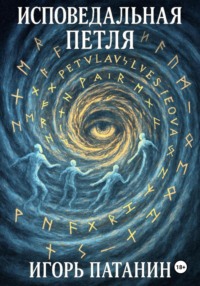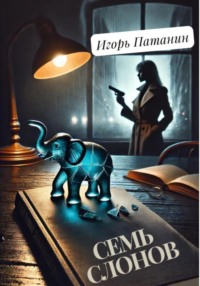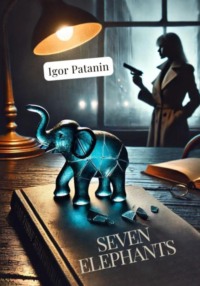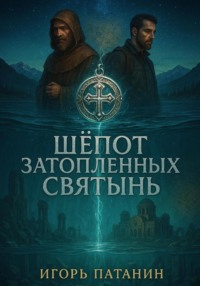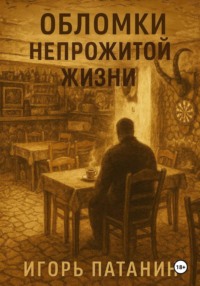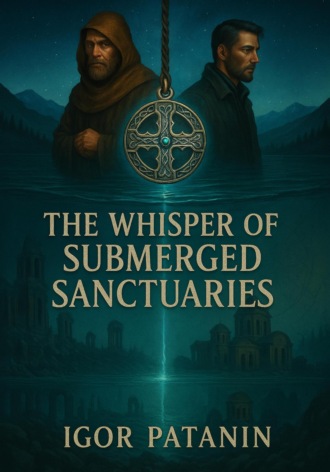
Полная версия
The Whisper of Submerged Sanctuaries
Tears stood in the young man's eyes.
"I don't want to leave you, teacher."
"But you must," Thomas said firmly. "Not for me, not for yourself. For those who will come after us. For those who may one day need the crystal's power."
He embraced his pupil, holding him tightly to his chest.
"Go by mountain paths," he whispered. "Local shepherds will show you secret trails. Stay away from main roads. And remember: light in water, water in light. Solomon's key will open the way."
"Light in water, water in light," David repeated. "Solomon's key will open the way."
They drew apart. Thomas pronounced a blessing in Aramaic, the ancient language of their faith, and made the sign of the cross over his pupil.
"Go in peace, my son. And may the Lord keep you."
David bowed his head, accepting the blessing, then quickly, without looking back, walked away. At the edge of the path leading down from the plateau, he turned one last time. Thomas still stood there, against the backdrop of the rising sun, tall and straight. His figure seemed to glow in the rays of dawn, as if woven from light itself.
David raised his hand in a farewell gesture and began to descend. Within moments, he disappeared among the rocks and shrubs.
Thomas remained standing motionless for a long time, gazing after his departing pupil. Then he turned and looked at the lake, shimmering in the rays of the morning sun.
"Lord," he whispered, "give him strength to fulfill his mission. And give me courage to face what is to come."
He knew that returning to the monastery meant, most likely, condemning himself to death. The Mongols did not leave alive those who resisted. But Thomas had a plan—a mad, desperate plan that might give the remaining refugees a chance for salvation.
He took a deep breath, gathering his courage, and headed back to the stone buildings. A conversation with the abbot of the Armenian monastery, old Father Grigor, awaited him. They needed to prepare a feigned surrender of the monastery, while the majority of the refugees would secretly leave through an underground passage known only to a few.
Three days later, Thomas sat in a dungeon—a cramped cellar with an earthen floor and rough stone walls. His hands were tied behind his back, his legs bound with rope. His face was covered with bruises, one arm, twisted during interrogation, throbbed painfully.
The Mongol noyon Jebe was known for his cruelty, but also for his perspicacity. He quickly realized that Thomas was not just one of the refugees, but a leader, a keeper of knowledge.
The interrogations continued day after day. Jebe wanted to know where the treasures were hidden. He was not interested in gold and silver—he was looking for some special item. "The Stone of Power," as he called it.
Thomas remained silent, no matter what they did to him. Even when the pain became unbearable, he found solace in prayer and thoughts that David was already far away, beyond the Mongols' reach.
In the dim light of a torch burning in the corridor, he gazed into the semi-darkness of his dungeon and thought of those who had already left this world. The abbot of the Armenian monastery, Father Grigor, was killed on the first day of the siege when he refused to hand over the refugees. Many brothers and sisters died protecting the children. But a large group managed to escape through the underground passage while Thomas negotiated with the Mongols, deliberately buying time.
The creaking of the door roused him from his reverie. Jebe entered the dungeon, accompanied by his shaman—a thin old man with a bird-like face and eyes that seemed to reflect other worlds.
"You can still save your life, monk," the noyon said without preamble. "Tell me where the stone of power is hidden, and I will release you."
Thomas looked at him silently. He knew Jebe was lying. The Mongols released no one.
"Our shaman," the noyon pointed to the old man, "says the stone is somewhere nearby. He can feel its power."
The shaman nodded, not taking his penetrating gaze from Thomas.
"It glows in the water," the old man said in a creaky voice. "But there is much water around. The lake is large."
Thomas felt a chill run down his spine. Had the shaman truly sensed something? Or was it a coincidence?
"You know that sooner or later we will find it," Jebe continued. "The great khan has ordered every stone to be turned, every stream to be dried up if necessary. He wants to obtain the stone of power."
"Why?" Thomas asked, breaking his silence. "Why does Genghis Khan need this stone? He already has power over half the world."
Jebe smirked.
"The great khan is mortal, like all men. He seeks that which will extend his life, make him stronger." The noyon leaned closer. "They say this stone heals any wound, grants longevity and strength of spirit. Is that not so?"
Thomas turned away, not wanting to show how much these words troubled him. The Mongols knew too much about the crystal.
"If I had such a stone," he said slowly, "I would hide it so that no one could find it. Because the power you speak of is not meant for people. Especially for those who crave power."
The shaman suddenly made a strange sound—something between a laugh and a croak.
"I told you, noyon. This man knows more than he says. He hides the stone not out of fear, but out of conviction."
Jebe looked thoughtfully at Thomas.
"You know, monk, I respect your resilience. Not many can endure what you have endured." He straightened up. "But my patience is not endless. Tomorrow at dawn, we will continue our conversation. And if you do not tell everything you know, I will be forced to resort to extreme measures."
With these words, the noyon left, the shaman following him. The dungeon door slammed shut with a crash.
Thomas leaned back against the wall, trying to find a position in which his wounded body would hurt least. He understood that he would not survive the next day.
But this did not frighten him. The main thing was that David had escaped with the medallion, that the crystal's secret was preserved, that the knowledge would be passed down the chain of guardians, from generation to generation, until the time came.
In the dim torchlight filtering through the grate in the door, Thomas mentally repeated the ancient words of prayer, preparing for what lay ahead. He knew he would die, but he also knew that his cause would live on.
And in this knowledge, there was a strange, calm certainty that gave him strength to meet the final dawn with peace in his soul.
The guard had dozed off at the dungeon door when he noticed a strange glow seeping from under the loosely closed door. He rose, rubbing his eyes, and peered through the small window.
The cell was empty. The ropes that had bound the prisoner lay on the earthen floor, but the monk himself was nowhere to be seen.
With a cry of alarm, the guard flung open the door. He searched every corner of the cramped dungeon but found no trace of the prisoner. No tunnel, no broken lock, no other signs of escape. Thomas had disappeared as if dissolved into thin air.
The news quickly reached Jebe. The noyon personally searched the dungeon, then the entire monastery. He ordered a search for the fugitive on the lakeshore, in the mountains, and questioned all the local inhabitants.
But Thomas was never found.
Jebe, enraged by the failure, ordered the monastery burned to the ground. Flames consumed the ancient walls, turning the centuries-old abode into smoking ruins.
The shaman, observing the fire, approached the noyon and quietly said:
"This man was no ordinary monk. There was a power in him that we do not understand."
Jebe stared grimly at the fire.
"We will search for the stone without him," he said resolutely. "Send divers into the lake. Check every cave in the surrounding mountains. The stone must be somewhere around here."
The shaman shook his head:
"Now that the monk has disappeared, I feel that the stone's power has become more hidden, more distant. As if he has strengthened the protection of his secret."
"The prophecy states that the stone of power will one day return to the world," Jebe said thoughtfully. "Perhaps not in our time. But someday."
Wind from the lake scattered the ashes of the burned monastery high into the mountains. Gray flakes swirled in the air, like the last farewell of the ancient sanctuary.
And somewhere far from these places, young David continued his journey, carrying within him knowledge that would one day, centuries later, lead other seekers to the hidden sanctuary.
It was deep night. Lake Issyk-Kul was calm and dark, only a silver path of moonlight shimmered on its surface. On the shore, among the stones, sat a solitary figure. His face was hidden by a hood, but in the moonlight, one could discern ascetic features and attentive eyes.
Thomas gazed at the waters of the lake, knowing that he would never again see either David or the other brothers and sisters of his community. Now his path lay in another direction.
Thomas raised his eyes to the starry sky. He knew he had to go far, to where even the most skilled of Genghis Khan's spies could not find him.
With a heavy sigh, the monk rose and headed toward the dark silhouettes of mountains reflected in the waters of Issyk-Kul. Ahead lay his final mission and a long, solitary journey.
He did not look back. The past remained behind, and the future was in God's hands and those to whom he had entrusted his knowledge.
Thomas's figure dissolved into the night darkness, as if it had never been there at all.
Chapter 7: Betrayal
Dawn over Issyk-Kul was like the slow awakening of an ancient deity. The sun, rising from behind the mountain peaks, painted the waters of the lake in crimson and gold, casting long shadows from the coastal cliffs. In such moments, it was easy to believe the old legends of sunken cities and hidden treasures.
Alexei sat on a rock at the entrance to a small cave where he and Dinara had spent the night. Rustam's death still weighed heavily on his conscience. If he hadn't brought this cursed medallion, the old man would still be alive. Sitting in the cool morning breeze, Alexei turned the silver disc in his hands, studying the ancient symbols and trying to understand if it was truly worth the price they had already paid.
Dinara emerged from the cave, stepping quietly on the stony ground. Her eyes were red from crying, but her back remained straight, and her movements conveyed the determination of someone who would not allow grief to break them.
"How are you?" Alexei asked, rising to meet her.
"I'll survive," she answered briefly, looking at the lake. "Grandfather knew what he was getting into. He always said the secrets of Issyk-Kul demand sacrifices."
She turned away, brushing aside an unbidden tear.
"We need to go," she added in a firmer voice. "Karabaev's men won't stop searching."
Alexei nodded, tucking the medallion under his shirt. They descended from the hill and headed toward the nearest village, moving along goat paths to avoid encountering pursuers. By noon, they reached a small settlement where Dinara, using the local language, managed to buy some food and water, and arrange for a shepherd to drive them to Cholpon-Ata in his old truck.
"Do you think this is safe?" Alexei asked as they bounced along the rough road in the open truck bed filled with hay. "Karabaev is surely searching for us all along the shore."
"That's the point," Dinara replied, covering her face with a scarf against the dust. "He won't expect us to return to a major tourist center. Besides, Uncle Ermek has a house on the outskirts. We can rest and decide what to do next."
Alexei nodded, though a strange feeling of unease wouldn't leave him. The loss of Rustam's book was a serious blow—it contained important information about the treasure's location and the "Key of Solomon." Now they were left with only the medallion and fragments of knowledge that Dinara had received from her grandfather.
By evening, they reached the outskirts of Cholpon-Ata. The shepherd dropped them at a crossroads and, after receiving payment, drove off, raising a cloud of dust. Dinara led Alexei along a narrow path that disappeared into a thicket of poplars and willows.
"Uncle's house is half a kilometer from here," she explained. "Away from the main development, right by the lake."
They walked in silence, watchfully looking around. Twilight descended on the land, painting everything in silvery-blue tones. The air was filled with the scents of water, sun-warmed stones, and flowering herbs.
Ermek's house turned out to be a small single-story structure with a spacious veranda facing the lake. Old apple and cherry trees grew around it, and a small pier with a boat tied to it stood at the water's edge.
"Strange," Dinara frowned, approaching the house. "No lights, though Uncle's car is in the yard."
Alexei tensed. Something wasn't right. It was too quiet; even the birds weren't singing in the garden.
"Wait," he held Dinara back by the arm when she was about to step onto the veranda. "Let's look around first."
They circled the house, peering through windows. Inside, it was dark and seemingly empty. But when they approached the back door leading to the kitchen, they heard muffled voices.
"That's Uncle," Dinara whispered, listening. "But who is he talking to?"
They carefully crept up to the window and peered inside. In the kitchen's half-darkness, illuminated only by the dim light of a table lamp, Ermek sat at the table. Opposite him was a man in a dark jacket, whose face they couldn't make out.
"I did everything I could," Ermek's voice reached them. "I brought them to Rustam, as you asked."
"But they escaped," his companion replied coldly. "And the old man died without revealing all the details to us."
"That's not my fault!" Desperation sounded in Ermek's voice. "I didn't know they would run away! I thought you just wanted to talk to them, study the medallion…"
"Don't lie to me, Ermek," his companion cut him off. "You knew perfectly well what was happening. You knew that Karabaev would stop at nothing to get the 'Key of Solomon.'"
Dinara froze beside Alexei, her eyes widening with shock and the pain of betrayal.
"I thought I could protect them," Ermek continued. "Wanted to negotiate with Karabaev… so no one would get hurt."
The man in the dark jacket laughed sharply:
"Negotiate with Karabaev? Are you that naive or just stupid? This man will destroy anyone who stands in his way." He leaned forward, and the lamplight momentarily illuminated his face. Alexei recognized one of those who had been with Karabaev in the cave. "Now you must correct your mistake. Find your niece and that Russian. Bring them here."
"And then?" Ermek asked quietly.
"Then Karabaev will decide what to do with them."
Dinara backed away from the window, her face contorted with pain. Alexei embraced her shoulders and carefully led her away from the house.
"My own uncle," she whispered when they had gone far enough. "How could he? After everything grandfather did for him…"
"Judging from what we heard, he didn't want anyone to get hurt," Alexei carefully noted, though he too was shaken by what they'd overheard. "It seems he's confused and afraid of Karabaev."
"That's no excuse," Dinara said sharply. "He brought us to grandfather, knowing that Karabaev's men could appear at any moment. He…" her voice broke. "He's guilty of grandfather's death."
They moved even further away, deeper into the coastal thickets, and sat on a fallen tree to decide what to do next.
"Where to now?" asked Alexei. "We have no money, no transportation, no safe place."
Dinara gazed thoughtfully at the lake, shimmering in the last rays of sunset.
"I have a friend in Karakol," she finally said. "From university days. He works as a curator at a museum. We could try to reach him."
"How far is it?"
"About a hundred and fifty kilometers along the eastern shore of the lake."
Alexei whistled:
"On foot, we'd be walking for days."
"There are buses," Dinara objected. "But using public transportation is risky. Karabaev's men are surely checking all routes."
"What about a boat?" Alexei nodded toward the lake. "Your uncle has a boat. We could…"
"Steal it?" Dinara smiled bitterly. "Why not. After what he did, it would be fair."
They decided to wait until deep night, then sneak to the pier and take the boat. Until then, they remained in the coastal thickets, watching Ermek's house.
Close to midnight, a black SUV pulled up to the house. Several people got out, among whom they recognized Karabaev. The oligarch quickly ascended the veranda and entered the house.
"This doesn't look good," Alexei muttered. "Looks like Karabaev decided to personally control the situation."
Half an hour later, the SUV left, taking Ermek with it.
"Now," Dinara said decisively. "While no one's there, we need to take the boat."
They quickly descended to the pier. The boat turned out to be a small motorboat, powerful enough to cross the lake quickly. Alexei, who had some experience operating such vessels, quickly figured out the engine.
"Full tank," he reported. "We'll have enough to reach Karakol."
Dinara untied the ropes securing the boat, and they slowly moved away from shore. When they were at a sufficient distance, Alexei started the engine, and the boat slid across the dark water, leaving a foamy trail behind.
The night was moonless, stars hidden behind clouds, which worked in their favor—they were difficult to spot from shore. They kept at a distance from the shore, but close enough to see the lights of coastal villages.
"What will we do next?" Alexei asked, shouting over the engine noise. "We don't have Rustam's book, no detailed information about the treasure…"
"We have the medallion," Dinara replied. "And something else."
She took a small notebook from her jacket pocket.
"I wrote down some of grandfather's stories when I visited him last summer. Not everything, of course, but the main details about the treasure's location and the 'Key of Solomon.'"
Конец ознакомительного фрагмента.
Текст предоставлен ООО «Литрес».
Прочитайте эту книгу целиком, купив полную легальную версию на Литрес.
Безопасно оплатить книгу можно банковской картой Visa, MasterCard, Maestro, со счета мобильного телефона, с платежного терминала, в салоне МТС или Связной, через PayPal, WebMoney, Яндекс.Деньги, QIWI Кошелек, бонусными картами или другим удобным Вам способом.


